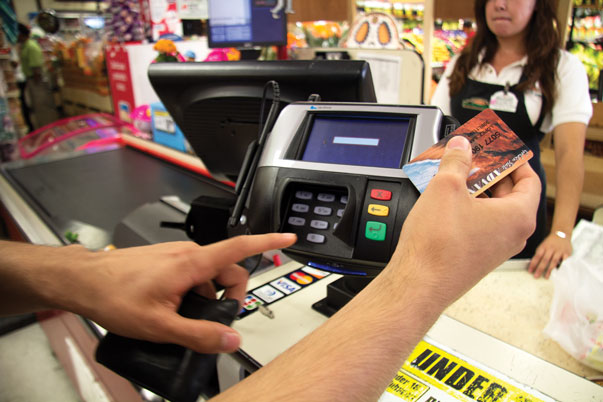
By Alex Olivares
Families benefitting from the Supplemental Nutrition Assistance Program, formerly known as food stamps, will receive less aid from the federal government.
About $5 billion in cuts to the program take effect this month. This means roughly $36 less per month for a household of four receiving SNAP benefits, according to the United States Department of Agriculture.
The USDA released a report in August that showed that the bonus SNAP received from the stimulus package lost more than half of its value after inflation affected the price of food between 2009 and 2011.
Thecutbacks today could lead to beneficiaries receiving less help than they got prior to the recession.
It may be tempting for liberals to lay blame on Republicans for this reduction, but it was the mismanagement of funds by Democrats that burdened the 48 million recipients of SNAP.
As the Great Recession began, a Democratic Congress scrambled to author a stimulus package to heal the economy. This resulted in the American Recovery and Reinvestment Act of 2009, which included increases to SNAP benefits through 2015.
However, effects of the recession worsened, Democrats unwisely used the funds that should have been used to continue food stamp bonuses available past 2013.
State officials found themselves needing additional aid to protect their economies. Democrats provided this by transferring money budgeted for SNAP to prevent state cuts in Medicaid and further layoffs. Later, first lady Michelle Obama began her Let’s Move! campaign to end childhood obesity through healthier school lunches, but this was also financed through dollars intended for SNAP.
There is irony in the attempts Democrats made to help low-income citizens get through the recession: in helping constituents keep their jobs to put food on the table and improve nutrition in schools, they pilfered money that otherwise kept SNAP recipients — those most in need — from going hungry.
Noted economist John Maynard Keynes once said, “In the long run, we’re all dead,” urging fiscal policies that help the current state of citizens. But the decisions Democrats made a few short years ago were more than short-sighted — they were uninformed and counterproductive.
A family of four following the government’s Thrifty Food Plan will lose about 21 meals per month. Low-income households such as these require food security most of all.
When federal funds are low, financing to protect households from poverty should be derived from non-essential services, not those directly responsible for the daily survival of impoverished and starving families.
To take such action is simply shuffling around poverty, not helping to address the problem.
- In Photos: Fiestas Patrias 2025 - September 25, 2025
- The two-party system is failing us. - October 19, 2024
- Read our Fall 2023 Print: Vol. 100 No. 1 - October 23, 2023











